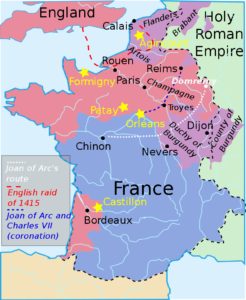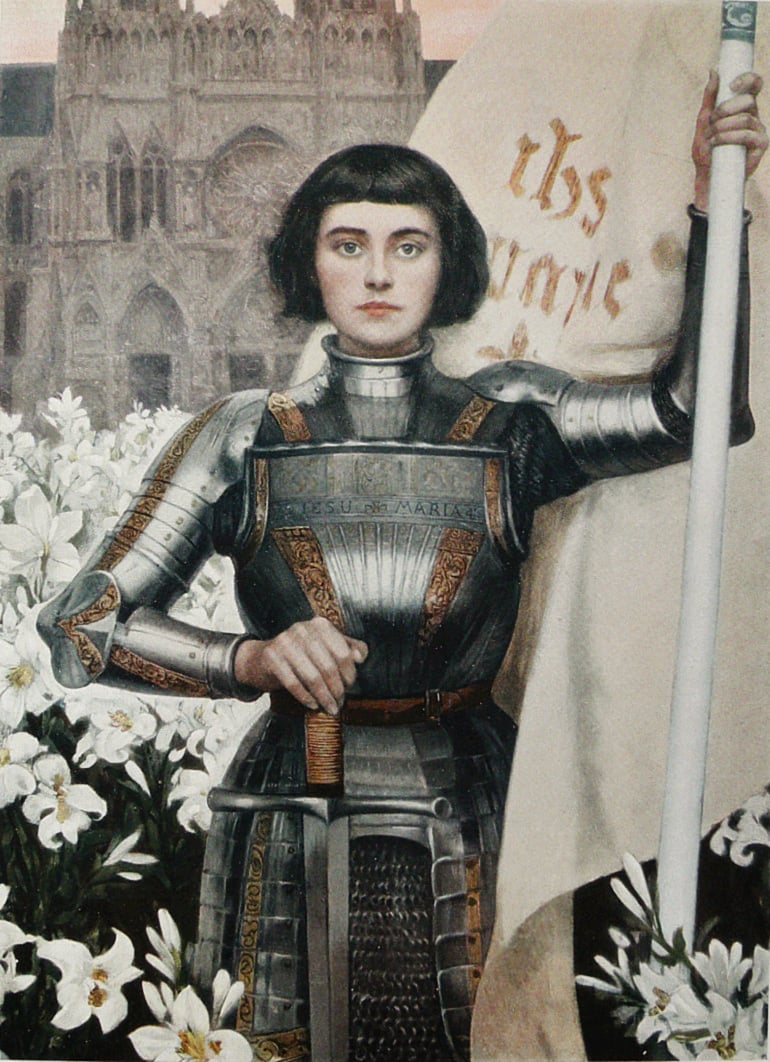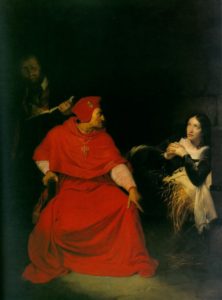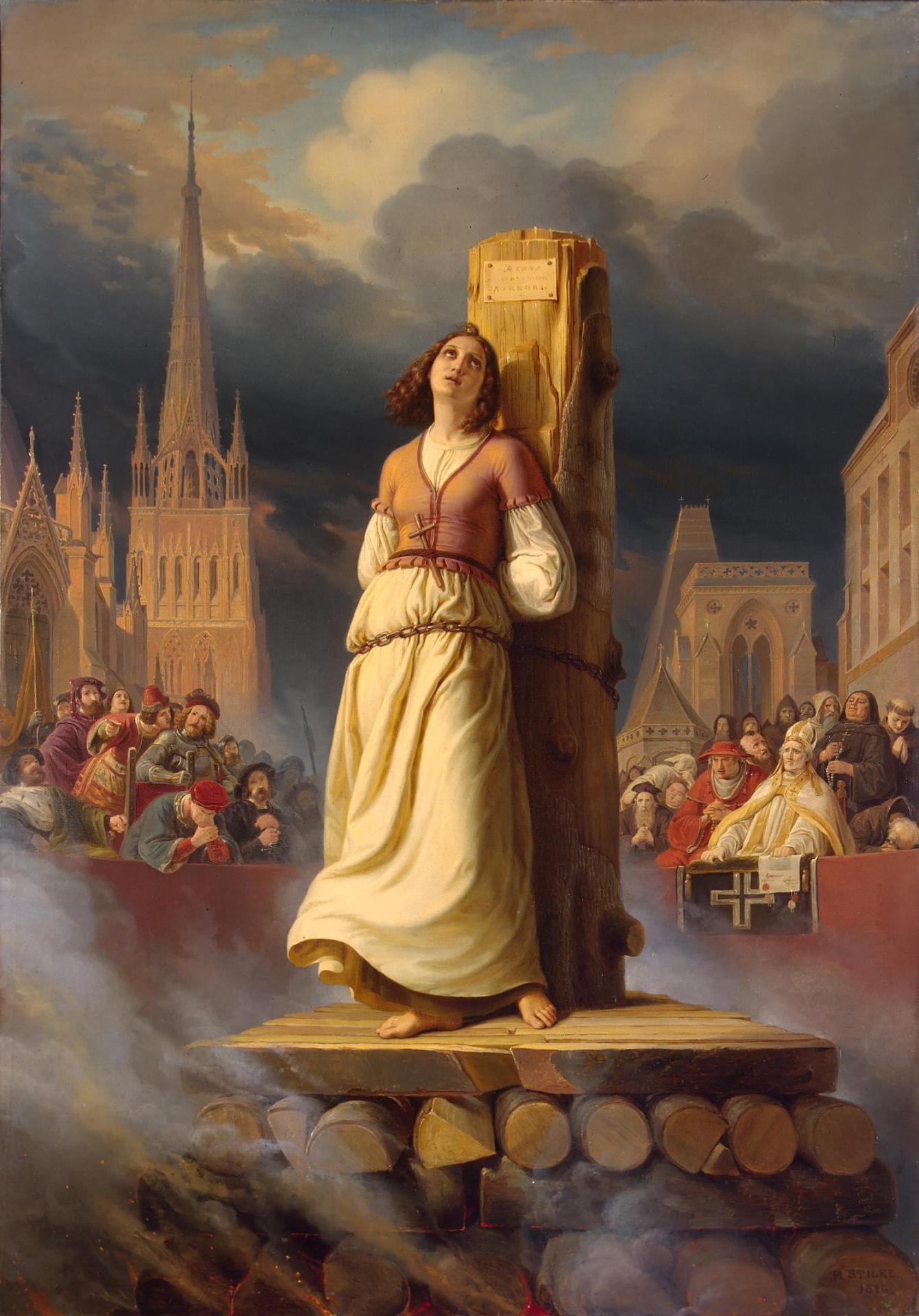Jeanne d’Arc (hereafter referred to by her English name, Joan of Arc) was born circa 1412 to devout Catholic parents in the small village of Domrémy, France. At a time when virtually all women were expected to spend their lives sewing, milking goats, and having children, she instead would turn the tide of a century-long war and fundamentally change the course of world history.
Because Joan of Arc’s life was so deeply intertwined with the events of the Hundred Years’ War, a brief time line of the conflict is necessary to understand her actions and motives. The Hundred Years’ War (actually, a series of wars that would last 116 years) began in 1337 as an inheritance dispute between France and Britain over the French monarchy.
In 1066, the Norman king William the Conqueror took over England but also retained his claim to the French throne.1 Many generations later, in 1328, King Charles IV of France died. This meant that, according to a longstanding treaty, William’s descendant, Edward III, would accede to the throne in the absence of a more legitimate French heir—or so the English thought.2 Instead, France crowned Philip VI king, effectively ignoring the treaty from England’s perspective. An enraged Edward invaded France in 1337, but the conflict remained unresolved in 1360. By then, both countries were tired of war, for the time being, so France offered Edward a large chunk of land in the north in exchange for relinquishing his claim to the French throne, and he accepted.
In 1380, France crowned Charles VI, who was quite insane (he believed that his body was literally made of glass). He was such an incompetent ruler that in 1407, the French Houses of Orléans and Burgundy began fighting one another, each seeking to replace Charles with one of their own.

Map of France c. 1415-1429. Red, purple, and blue regions indicate territory controlled by Henry VI, Philip III, and Charles VII, respectively. Wikipedia.
In 1413, one year after Joan’s birth, Henry V was crowned king of England. In yet another attempt to take the French throne for England, he tried to marry one of Charles’s daughters. Charles refused, and the two countries went to war yet again. In 1420, the French House of Burgundy officially allied with England and enlisted the aid of Charles’s wife, Isabeau of Bavaria, to convince him to sign the Treaty of Troyes, which positioned Henry to inherit the French throne upon Charles’s death.3 However, both kings died at nearly the same time, Henry dying shortly before Charles, meaning that his ten-month-old son, Henry VI, was officially the king of both countries.
The House of Orléans had had enough and, refusing to be ruled by an infant, crowned Charles of Valois, which violated the Treaty of Troyes. This time, however, the English weren’t stuck in England—many English soldiers were occupying a large chunk of northern France that included Paris and Reims: the city where Charles of Valois’s coronation would have to take place in order for his rule to be official. This created a political and military stalemate that would persist for years.4
By 1425, when Joan was thirteen years old, England had all but annihilated France militarily. Although barely a teenager, Joan ardently believed that she was able to do something to alleviate the suffering that she and her countrymen experienced under the yoke of English occupation.5 Around this time, she began having “visions” of various Catholic saints and angels commanding her to liberate France from English control. People (especially young women) claiming to experience religious visions was a common occurrence in France at the time, but others rarely took them seriously. Joan, though, constantly told people of her visions and fully expected them to believe that God was literally speaking to her. As a result, she developed a reputation as being “an exhausting presence,” as one villager put it.

Joan of Arc listening to the voices by Eugène Romain Thirion
In May 1428, at the age of sixteen, she supposedly had a particularly powerful vision that motivated her to travel some three hundred miles to seek a personal audience with Charles in Chinon. However, her pro-Charles village of Domrémy was completely surrounded by English-controlled territory, so she first went to the nearby French stronghold of Vaucouleurs, intending to speak with its commander, Robert de Baudricourt. Not surprising, Joan’s demands for Baudricourt to provide an armed escort to take her to Charles were met with laughter and ridicule. She returned home, temporarily defeated.6
Later in 1428, Joan’s father tried to marry her off in an effort to quell what he saw as her troublemaking, but she successfully argued in court that she’d taken a vow of chastity and must remain single. For the next year, Joan would continue to speak of her visions to anyone who would listen. Rumors spread to other villages, and some French people even began to believe that she might be the long-prophesied virgin destined to lead France to victory over England.7
When the English-sympathizing House of Burgundy caught wind of Joan’s growing fame, they attacked her hometown in an attempt to quash any hint of renewed rebellion. (Several people were killed, but Joan was away at the time.) The attack was meant as a warning, but it had the opposite effect. An emboldened Joan returned to Vaucouleurs in January 1429. Having heard that the Burgundians considered Joan a target of some importance, and growing more desperate by the day, Baudricourt agreed to escort her to see Charles. The next month, Joan and a small group of soldiers rode to Chinon. Before leaving, she cut her hair and donned men’s clothing and armor, both to avoid unwanted attention from bandits and to show the men that she was willing to live as they did.8
When Charles heard that Joan had arrived in Chinon, he tried to avoid her by disguising himself as one of his own entourage. (He feared that his already tenuous authority would be undermined even further if word got out that random peasant girls could simply demand to see him.) Reportedly, she immediately identified him in the crowd despite never having seen him before. This feat—which seemed divine to Charles—in combination with his desperation over the state of France’s military and the news of Burgundy attacking Domrémy (which, to his mind, lent credibility to the rumors about Joan being God’s chosen warrior), convinced the would-be king to hear her out.
But first, for three weeks, he had Joan questioned day in and day out by a group of theologians who tested her knowledge of Catholic scripture and prophecy. She passed the tests with flying colors and, when she grew tired of being questioned, demanded that she be allowed to ride to—and break the English siege of—Orléans, a fairly important city that had been hotly contested for some time. In all likelihood, Charles had expected her to volunteer for a far more mundane task. Seeing nothing to lose, he agreed to allow her to try. At worst, he thought, she would quickly get herself killed, and he could forget about her.9
The French army’s financial straits were so dire that it was unable to pay a significant portion of its soldiers, many of whom nonetheless fought as volunteers. Charles made an announcement: Anyone willing to follow an untrained teenage girl into an unwinnable battle, for free, would be allowed to do so. To his great surprise, thousands of men showed up to fight under Joan’s banner.10
On April 29, Joan’s small army arrived at Orléans. It was still tenuously under French control, but every military outpost in the surrounding countryside was held by the British. It was only a matter of time before the city itself would fall. Jean de Dunois, the “Bastard of Orléans” (the local magistrate), was just about to formally surrender to the English and plead for leniency when Joan arrived; he was not pleased to hear of her plan. He refused to allow her to participate in city council meetings but failed to realize that his own severely demoralized soldiers were quickly being won over by Joan’s charisma.

A 1903 engraving of Joan of Arc by Albert Lynch
On May 4, Joan awoke from a nap, during which she’d dreamed of an angel that commanded her to attack the English immediately. She gathered her ragtag volunteer army—which now included some of the magistrate’s former soldiers—and hastily charged off to a nearby English-held fort, which a different part of the French army had just begun to assault (whether Joan knew that is unknown). Rallied by her banner and reinforcements, the outnumbered and under-equipped French soldiers renewed their attack and successfully reclaimed the fort.
By May 7, a mere three days later, the French army had retaken several more forts with the help of Joan’s troops and nearly broken the siege of Orléans; only one more English stronghold remained in the region. By this time, word of the “spooky” French maiden had begun to spread through the English army, and its officers marked her as a priority target. Joan was shot during the final battle for Orléans; in the morning, an arrow from a powerful English longbow pierced her shoulder and went all the way through it. Such a horrendously painful wound typically incapacitated soldiers for at least several days and often resulted in lifelong disabilities, but Joan was back on the battlefield by that afternoon.11
By the next day, the English had been routed. Orléans was saved. Joan had done exactly what she’d promised to do—she had done the seemingly impossible and earned herself the nickname “The Maid of Orléans” in the process. French soldiers began to flock to her banner in greater numbers, and even some of her ardent critics grudgingly admitted that perhaps there was something to this peasant girl from Domrémy.
Joan barely paused to rest after the liberation of Orléans. She needed to get Charles to Reims so that he could officially be crowned, but that would be a significantly taller order than what she’d just accomplished. Orléans was situated on the front lines—on the border between French- and English-controlled land—but Reims was deep in enemy territory. Charles was reluctant to entrust himself to Joan’s care for such a dangerous journey, but she persisted, and eventually, he agreed—on the condition that she ride ahead and clear the two-hundred-fifty-mile path first.12
Charles expected Joan to balk at the task, but she readily agreed. Over the next several weeks, she led her men along the route to Reims, liberating town after town from English control. Her assaults were so effective that, as word spread, more and more French people came to believe that she was indeed God’s chosen warrior—and some Englishmen began to fear that she was possessed by Satan.
Joan expressly forbade her men from looting or raping, both of which were common practices for victorious armies at the time.13 Many historians believe that such a command would have been laughed off and ignored—had it been issued by any other military officer. But Joan’s men were so fiercely loyal to her that they not only obeyed her order, they did so with little fuss. This order, perhaps more than any other single act, spoke to the nature of her motives: She fought only because she had to. She fought to defend life. She realized that taking life is necessary in war but didn’t revel in it, and she didn’t kill or destroy unnecessarily.14
On June 18, Joan engaged the English at the Battle of Patay, although other French regiments did most of the fighting. Still, the morale-boosting effects of Joan’s incredible charisma and well-known white banner were great assets to the French, even to those soldiers who previously only had heard tales of her visions and victories.
To say that France won a decisive victory at Patay would be an understatement. The English troops were completely crushed and utterly demoralized. When the English soldiers in Reims received reports of the battle, they decided to surrender the city to Joan without a fight. Back in Chinon, Charles—who perhaps had been expecting (or even hoping) that Joan would be killed on what he considered a fool’s errand—was dumbstruck when he received word that the path to Reims was clear. Joan returned to Chinon to escort him personally, and in the face of her ironclad resolve, he had little choice but to go along.15
A few weeks later, Joan, Charles, and their army reached Reims, having encountered no resistance from the scattered remains of English forces along the way. The city, which had been completely under English control just eighteen months earlier, opened its gates to Charles without hesitation. The magnitude of what Joan had accomplished almost can’t be overstated—and, indeed, many people at the time couldn’t believe it. A seventeen-year-old illiterate farm girl leading a few thousand men had done what seasoned generals commanding far larger forces could not. Charles of Valois entered Reims on July 16, 1429, and the next day he was crowned Charles VII of France. Joan of Arc never again claimed to have any divinely inspired visions, with one possible (and disputed) exception near the end of her life.

Joan of Arc at the Coronation of Charles VII by Jean Auguste Dominique Ingres
On August 28, 1429, Charles began negotiating with the Burgundians, who suddenly were rethinking their longstanding alliance with England. Joan wanted to continue her military campaign, but there’s little evidence to suggest that she was motivated by bloodlust or politics. More likely, she believed that a treaty with the Burgundians might stop the fighting for a while but ultimately would serve only to prolong the conflict that had already raged for more than ninety years. After all, several treaties that were meant to end the war already had been broken. Joan’s mystic visions had ceased, but she still desperately wanted to free France from English domination. To her mind, the job wasn’t done.
Fearing that an official armistice would render further military action against England an act of treason, Joan decided to act immediately, before Charles could sign a treaty with the Burgundians. On September 8, she gathered her most loyal followers and marched on Paris—without Charles’s knowledge or consent—intent on negating the need for a treaty by killing or driving away every last English soldier. It would prove to be a fatal mistake.16
Emboldened by her incredible (and, statistically speaking, incredibly unlikely) victories at Orléans and Reims, Joan was sure that she would find similar success at the gates of Paris. However, as heavily reinforced as the strongholds of Orléans had been, they paled in comparison to the towering thirty-foot walls around the capital. She halted outside one of its gates and demanded that the city be surrendered to her. In response, an English crossbowman on one of the ramparts promptly shot her in the thigh. As she was dragged to the rear by her men, she screamed for them to press the attack, but this time, even her near-hypnotic presence failed to inspire them. Paris was impregnable, and her soldiers knew it. They retreated.17
When Charles got word of Joan’s unauthorized campaign, he immediately ordered her cut off from the main army. She may have put him on the throne, but he wasn’t about to allow her to jeopardize an agreement that he (likely erroneously) thought would bring an end to decades of bloodshed and finally allow France to begin to recover. All shipments to her of weapons, food, and supplies were halted. Joan carefully rationed her remaining supplies and continued liberating small towns in the Parisian countryside until May 1430, when she was ambushed and captured by Burgundian soldiers.
Joan fully expected Charles to arrange some sort of trade for her life, but the Maid of Orléans’s good fortune finally had run out. She had crossed one line too many in the king’s eyes. In July, her Burgundian captors decided to hand her over to the English and thus wash their hands of her, as Charles had. When Joan realized the fate that awaited her as an English captive, she attempted suicide but survived.18
In January 1431, the English took Joan to Rouen and imprisoned her. She was hugely popular in France, and the English knew better than to simply execute her on the spot without “just cause.” Some pretense of a fair trial had to be maintained if the prosecutors were to feel reasonably safe from retribution. Joan would endure horrendous conditions in captivity before being formally charged in March with a total of seventy crimes against the English church and crown. Oddly, the church’s prosecutors viewed her habit of wearing men’s clothing as one of her most serious transgressions.19

Joan of Arc interrogated in her prison cell by the Cardinal of Winchester by Hippolyte Delaroche
In an attempt to bolster their case with religious authority, the prosecutors questioned Joan extensively on Catholic doctrine, believing that she would prove herself a heretic by answering at least some of their questions incorrectly. However, Joan displayed an encyclopedic knowledge of scripture, correctly answering each and every question posed to her. Unable to catch her in any theological traps, the inquisitors reluctantly threw out fifty-eight of the seventy original charges.20
By May, Joan’s captors still hadn’t managed to either convict or acquit her of the remaining twelve charges and were growing impatient. They finally decided to extort a written confession out of her. To that end, they dragged her outside for a mock execution, which Joan believed to be real until the very last moment. Afterward, they ordered her to sign a full confession, implying that if she refused, she would be executed for real, but not before being tortured.
For reasons unknown, Joan agreed to confess. Perhaps her legendary mental stamina had finally run out, or perhaps she simply wished to spare herself more needless pain. The confession contained a very specific clause stating that Joan would be executed immediately if she ever again wore men’s clothing—a provision that the illiterate Joan may not have even known she was agreeing to. A few days later, she was discovered dressed as a man in her cell. Her reasons for violating the terms of her confession—if she even did so knowingly—are lost to history. Some historians believe that she experienced one final “vision,” in which various saints berated her for betraying her convictions. Others believe that her guards took her female clothing by force and left her the choice of dressing in men’s clothes or being naked, possibly under the implied threat of rape in the latter case.21 In any event, the end result would be the same.
On May 30, 1431, Joan was marched to a nearby marsh to be executed. One of her guards reportedly risked his own career—perhaps even his life—to sneak a crucifix into her hand as some small measure of comfort. Joan was to be burned at the stake for crimes against the church and the English crown, although the true nature of her actions was far nobler: She had defended her convictions and her home against foreign aggressors.

Joan of Arc's Death at the Stake by Hermann Stilke
In at least some cases, prisoners who were to be burned at the stake were killed swiftly beforehand, if their jailors deemed them worthy of such “mercy.” Joan’s captors ordered her burned alive. She died in agony, begging for the archangel Michael to save her.22 Only in her last moments did she finally allow herself to cry and scream as we might expect a teenaged girl to do. She had more than earned such a moment of “weakness.”
Throughout Joan’s life, she carried herself as a man, and not only in the way she dressed and spoke. She lived as a human being ought to live in one of the most fundamental respects. Whatever her flaws, she refused to live as a helpless bystander in the face of adversity. Everyone around her merely prayed for liberation from England. Joan prayed, too, but she also took up a sword and fought for a primitive but admirable conception of freedom, defying her family, her community, and virtually every social more in the process.23 Although she wrongly believed that she received orders from heaven, her actions show that she genuinely wanted to end the rampant chaos and suffering imposed on her countrymen by foreign invaders—and that she was willing to fight and die to achieve that goal. At any rate, the story of Joan of Arc was over—or so the English thought.
Click To Tweet
Much of France mourned Joan’s death. Her men—and even some of Charles’s—fought on in her name, steadily rooting out small pockets of English resistance along the northern border of France. Peace negotiations—including those with the Burgundians—stalled as England began to demand more and more concessions. Charles grew tired of waiting and pressed the attack against England, both militarily and politically, convincing many of its allies to join him. In September 1435, Philip III, Duke of Burgundy, betrayed England and his former House to side with Charles, bringing Paris with him. Losing the capital was a devastating blow that would seal England’s fate in the war.24
Eighteen years later, the Hundred Years’ War—which Joan had radically changed the course of—was finally drawing to a close. Charles retook Rouen in 1449 and ordered a papal inquiry into Joan’s trial. In 1456, she was posthumously exonerated, and all of the charges against her were annulled.25
Neither England nor France could consistently claim the moral high ground during the Hundred Years’ War. Still, one testament to the core of Joan of Arc’s character is clear: She sought not conquest, treasure, or personal “glory,” but to end the bloodshed all around her. Modern historians often disagree about her motives, but the available evidence suggests that she genuinely believed that liberating France from English domination once and for all was the shortest path to peace—and she probably was right. Without her intervention, England almost certainly would have crushed France eventually, and the final death toll of the Hundred Years’ War likely would have been even higher. Despite her mysticism, Joan of Arc was a principled woman—and a true heroine.
You might also like
Endnotes
1. Biographics, “Joan of Arc: The Maid of Orléans,” YouTube, https://www.youtube.com/watch?v=oVPD5eFihKw (accessed May 16, 2019).
2. France and England employed different standards of determining royal succession. In this case, matrilineal versus patrilineal heritage was the point of contention.
3. Recall that Charles VI was literally insane. His actions seem nonsensical and self-contradictory because they often were.
4. Denise Baker, Inscribing the Hundred Years’ War in French and English Cultures (New York: SUNY Press), 6; Biographics, “Joan of Arc: The Maid of Orléans.”
5. W. S. Scott, “Letters of Jeanne’s,” Jeanne d’Arc la Pucelle, https://www.jeanne-darc.info/biography/letters/ (accessed May 27, 2019); seven of Joan’s eight surviving dictated letters show sincere empathy for those impacted by the war, as well as a repeatedly expressed desire to resolve conflicts without bloodshed when possible. (It was rarely possible.) The eighth letter, which threatens a divergent sect with violence for the “crime” of heresy, was likely not written by Joan, but by a priest who claimed she had written it. She may not even have known about the letter.
6. Kelly DeVries, Joan of Arc: A Military Leader (Stroud, Gloucestershire: Sutton Publishing, 1999), 37–40; Biographics, “Joan of Arc: The Maid of Orléans.”
7. Marina Warner, Joan of Arc: The Image of Female Heroism (Los Angeles: University of California Press, 2001), 24; Biographics, “Joan of Arc: The Maid of Orléans.”
8. Biographics, “Joan of Arc: The Maid of Orléans.”
9. Biographics, “Joan of Arc: The Maid of Orléans.”
10. Stephen Richey, “Joan of Arc: A Military Appreciation,” St. Joan of Arc Center, 2000, http://www.stjoan-center.com/military/stephenr.html (accessed May 16, 2019); Biographics, “Joan of Arc: The Maid of Orléans.”
11. Biographics, “Joan of Arc: The Maid of Orléans.”
12. DeVries, Joan of Arc: A Military Leader,96–97.
13. Biographics, “Joan of Arc: The Maid of Orléans.”
14. Biographics, “Joan of Arc: The Maid of Orléans”; Joan’s men often reported that she wept over the bodies of her enemies, distraught that they had not surrendered peacefully.
15. Juliet Barker, Conquest: The English Kingdom of France in the Hundred Years War (Cambridge: Harvard University Press, 2012), 123; Biographics, “Joan of Arc: The Maid of Orléans.”
16. Régine Pernoud, translated by E. Hymans, Joan of Arc By Herself and Her Witnesses (London: Scarborough House Publishing, 1982), 137; Biographics, “Joan of Arc: The Maid of Orléans.”
17. Pernoud, Joan of Arc By Herself and Her Witnesses, 138; Biographics, “Joan of Arc: The Maid of Orléans.”
18. Biographics, “Joan of Arc: The Maid of Orléans.”
19. Deuteronomy 22:5: “A woman must not wear men’s clothing, nor a man wear women’s clothing, for the LORD your God detests anyone who does this.” Why the church prosecutors chose to focus so heavily on Joan’s attire isn’t known with certainty. It’s likely that it was simply an easy target—everyone knew that Joan dressed as a man, and everyone knew that the Bible forbade it. More abstract theological charges were harder to “prove.”
20. Biographics, “Joan of Arc: The Maid of Orléans.”
21. Pernoud, Joan of Arc By Herself and Her Witnesses, 220
22. Biographics, “Joan of Arc: The Maid of Orléans.”
23. Even though Aristotle lived eighteen hundred years before Joan did, his writings were largely unknown in fifteenth-century France—certainly to illiterate peasants—and proper conceptions of freedom and individual rights wouldn’t be fully formulated until Ayn Rand did so in the 1950s. In Joan’s time, world affairs were completely dominated by religion; it would be anachronistic and unfair to expect her to have understood or practiced a fully rational code of ethics as is possible to us today.
24. R. A. Griffiths, “Henry VI (1421–1471),” Oxford Dictionary of National Biography, May 28, 2015, https://archive.is/20180810174907/http://www.oxforddnb.com/view/10.1093/ref:odnb/9780198614128.001.0001/odnb-9780198614128-e-12953 (accessed May 16, 2019).
25. Biographics, “Joan of Arc: The Maid of Orléans.”


![[TEST] The Objective Standard](https://test.theobjectivestandard.com/wp-content/uploads/2017/10/logo.png)












